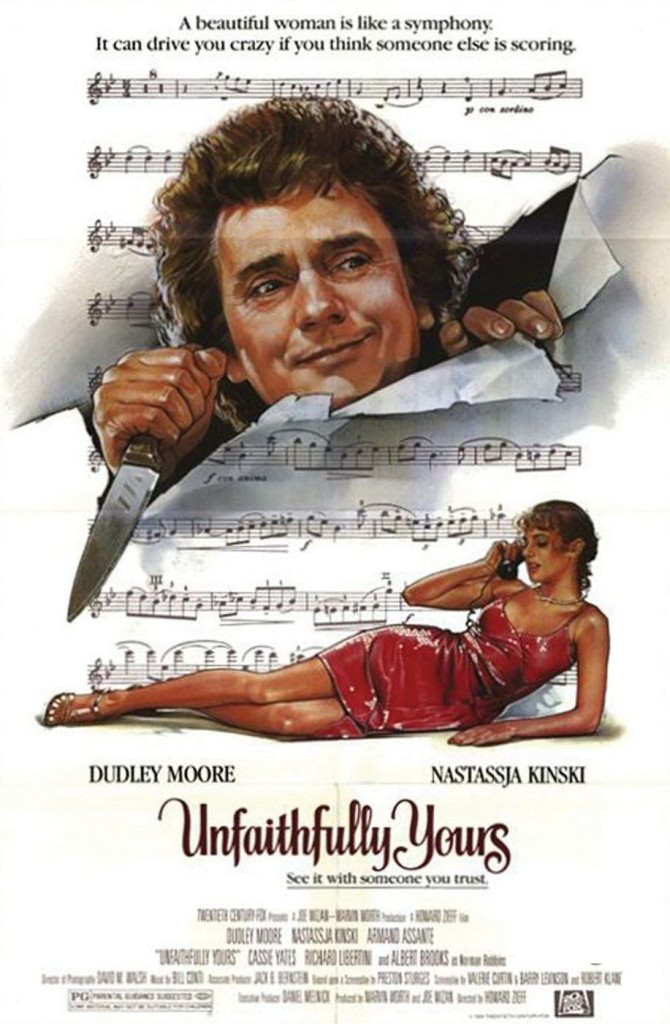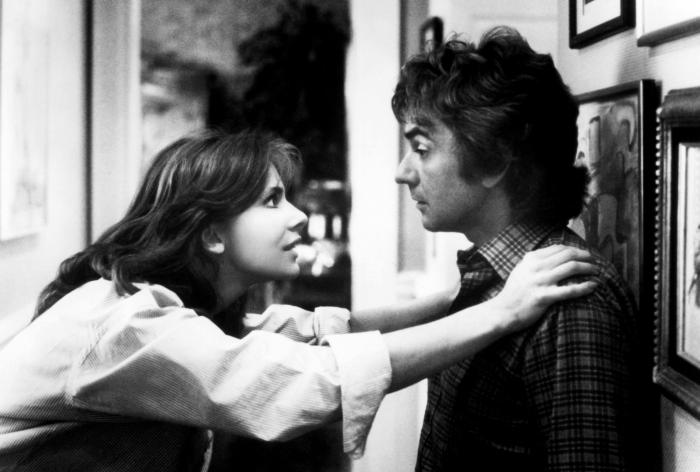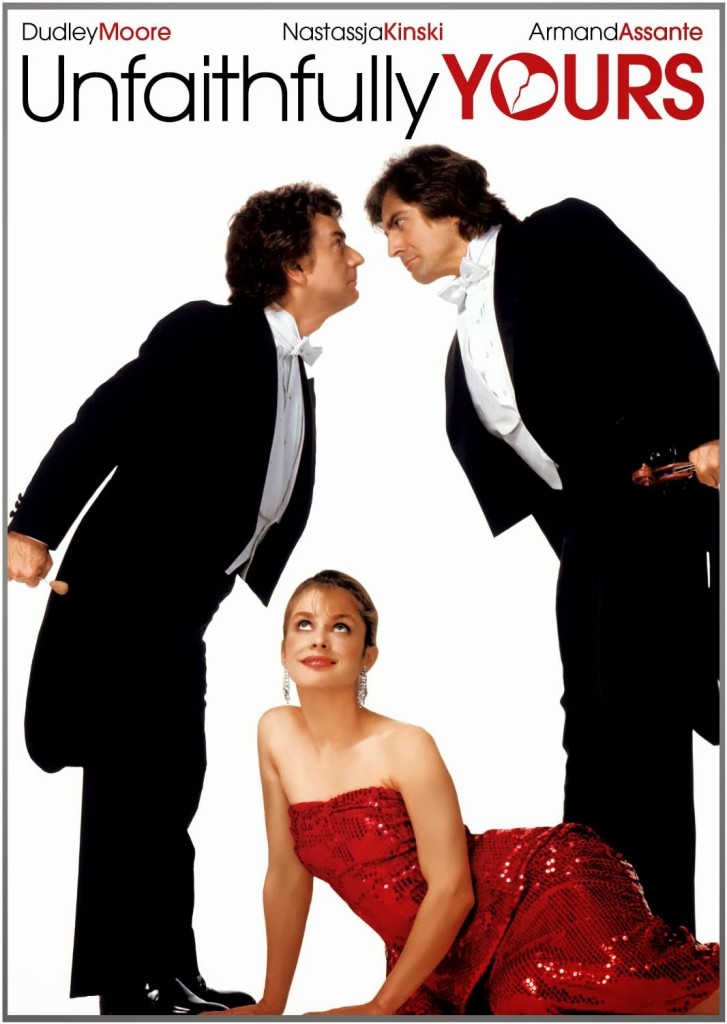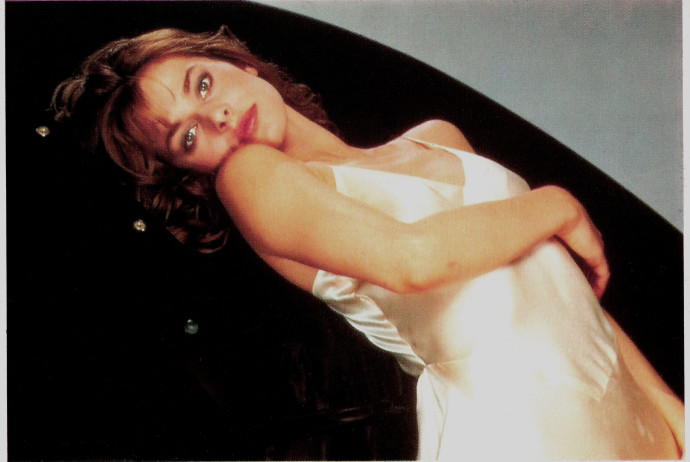Dir: Howard Zieff
Star: Dudley Moore, Nastassja Kinski, Armand Assante, Albert Brooks
 Conductor Claude Eastman (Moore) appears to have everything you could want: a hugely-successful career and a loving, attractive wife, Daniella (Kinski). However, a slight linguistic mix-up around the term “keep an eye on her”, leads to a private investigator being hired to watch Daniella while Claude is out of town. The PI’s report shows an unknown man, wearing Argyle socks, leaving Claude’s apartment in the middle of the night, triggering a tsunami of paranoia in him, that his young wife is cheating on him? When he sees a colleague, concert violinist Max Stern (Assante) wearing socks, and Daniella apparently confesses the affair to him, he concocts a wild plan to murder the pair of lovers and get away with it. However, he is entirely unaware that it’s all a horrible misunderstanding: yes, Max is indeed having an affair, but it’s not with Daniella, and the assignation just happened in their apartment.
Conductor Claude Eastman (Moore) appears to have everything you could want: a hugely-successful career and a loving, attractive wife, Daniella (Kinski). However, a slight linguistic mix-up around the term “keep an eye on her”, leads to a private investigator being hired to watch Daniella while Claude is out of town. The PI’s report shows an unknown man, wearing Argyle socks, leaving Claude’s apartment in the middle of the night, triggering a tsunami of paranoia in him, that his young wife is cheating on him? When he sees a colleague, concert violinist Max Stern (Assante) wearing socks, and Daniella apparently confesses the affair to him, he concocts a wild plan to murder the pair of lovers and get away with it. However, he is entirely unaware that it’s all a horrible misunderstanding: yes, Max is indeed having an affair, but it’s not with Daniella, and the assignation just happened in their apartment.
In some ways, this feels like a compilation put together from elements of Kinski’s previous works. Like Cat People, it’s a remake of a forties movie, in this case, a Preston Sturges pic with Rex Harrison, Linda Darnell and Rudy Vallee as the three leads. Like Spring Symphony, Kinski is again hanging out with a classical musician. And like… oh, just about her entire cinematic output thus far, but particularly Stay as you Are, Kinski is again involved with an older man, Moore being more than 25 years her senior. This leads to allegedly comedic references to Daniella being a “child bride,” which have really not stood the test of time very well. [There was something of the same in the original, but the age difference between Harrison and Darnell was rather less, at about 15 years.]
Obviously, this kind of comedic farce requires a certain amount of disbelief suspension, and needs some careful scripting. The writer needs to take successive elements that seem not to unreasonable in isolation, and use those as building blocks, to create a teetering tower of chaotic misinterpretation and subsequent poor decisions. It’s been some time since I’ve seen the original (also written by Sturges), so I can’t say how much of the apparent problem here were also in the original. But I think the point where I finally toppled over into “I’m so sure…” was with Claude’s plan, where we are expected to believe everyone would mistake the 5’3″ Moore for the 5’10” Assante, even wearing a mask, and especially considering that Kinski splits the difference nicely, at 5’7″.
 Another major problem – and I do remember this from the original – is that Dudley Moore is much, much less than Rex Harrison. That’s not really intended as a particular slight on Moore, because just about every actor in the history of cinema is much, much less than Harrison, but it’s certainly an area in which the remake doesn’t match its predecessor. Indeed, that’s probably the main issue here: unlike Cat People, which warped its inspiration into a radically different direction, dragging it kicking and screaming from the era in which it was conceived, Unfaithfully Yours is a much more conventional remake. There’s very little here which doesn’t feels like it could easily have been filmed in the forties, leaving the entire exercise feeling rather pointless, except for cashing out on Moore’s unexpected box-office stardom, in the wake of 10 and Arthur.
Another major problem – and I do remember this from the original – is that Dudley Moore is much, much less than Rex Harrison. That’s not really intended as a particular slight on Moore, because just about every actor in the history of cinema is much, much less than Harrison, but it’s certainly an area in which the remake doesn’t match its predecessor. Indeed, that’s probably the main issue here: unlike Cat People, which warped its inspiration into a radically different direction, dragging it kicking and screaming from the era in which it was conceived, Unfaithfully Yours is a much more conventional remake. There’s very little here which doesn’t feels like it could easily have been filmed in the forties, leaving the entire exercise feeling rather pointless, except for cashing out on Moore’s unexpected box-office stardom, in the wake of 10 and Arthur.
 Not that there aren’t some pleasures to be had here. The music is probably among the best of them: Moore was a very talented keyboard player, winning an organ scholarship to Oxford, and a renowned jazz pianist, so we don’t have to endure any of the “actor waves his hands above the keys” fakery. But Assante is pretty convincing too: I don’t know if he has any skills as a violinist, but he certainly gives that impression. Perhaps the film’s most memorable scenes has Claude and Max engaging in “dueling violins” at a restaurant, initially for Daniella’s attention, before it becomes more personal. The whole sequence where Claude’s murder plan plays out in his (literal) mind’s eye, backed by what I think is a Tchakovsky violin concerto, is also well-constructed, and in sharp contrast to the much more messy reality which then transpires.
Not that there aren’t some pleasures to be had here. The music is probably among the best of them: Moore was a very talented keyboard player, winning an organ scholarship to Oxford, and a renowned jazz pianist, so we don’t have to endure any of the “actor waves his hands above the keys” fakery. But Assante is pretty convincing too: I don’t know if he has any skills as a violinist, but he certainly gives that impression. Perhaps the film’s most memorable scenes has Claude and Max engaging in “dueling violins” at a restaurant, initially for Daniella’s attention, before it becomes more personal. The whole sequence where Claude’s murder plan plays out in his (literal) mind’s eye, backed by what I think is a Tchakovsky violin concerto, is also well-constructed, and in sharp contrast to the much more messy reality which then transpires.
Kinski’s role is certainly pivotal, and it’s easily credible how Claude could be concerned about her fidelity, with Assante providing an alternative nearer her own age (at least by the standards of Kinski’s filmography, he being “only” 11 years her senior!). She’s playing an Italian, and does deliver the sparky intensity the stereotypes would demand from that country. Daniella – and, indeed, Max too – actually comes over as much more likeable than Claude, who turns into a shrieking bag of whining insecurities, for which it’s difficult to find much sympathy. His troubles are almost entirely of his own making, and if the ending does fit in with Daniella’s mercurial character, capable of bouncing from love to hate and back again in the blink of an eye, it still seems far too quick, bolted on for the sake of Hollywood convention, instead of flowing organically from what has gone before.
Indeed, there’s also a sharp change in tone between first and second halves, in terms of the style of humor which they use. The latter is much more slapsticky, with Claude staggering around, trying to put his master murder-plan into operation, only for just about everything conceivable to go horribly wrong. There’s something vaguely reminiscent of Fawlty Towers, not just in the Britishness of the leading man, but in the way he plows on towards his goal, even as its obvious he’s doing nothing but digging himself a deeper hole and causing further carnage, when the sensible thing to do would be to cut your losses and give up. Of course, it’s neither as well-written or performed, and unlike Cat People, this remake leaves me with a strong desire to track down and watch the original, and see if it’s really as superior as I remember it.
